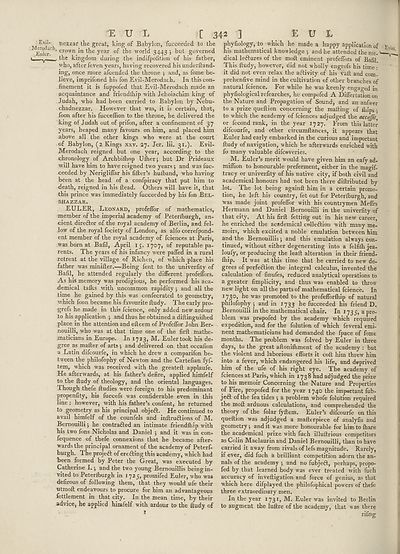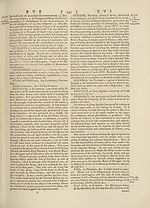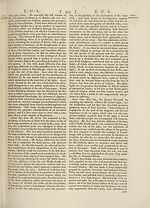Encyclopaedia Britannica, or, a Dictionary of arts, sciences, and miscellaneous literature : enlarged and improved. Illustrated with nearly six hundred engravings > Volume 8, ELE-FOR
(370) Page 342
Download files
Complete book:
Individual page:
Thumbnail gallery: Grid view | List view

E U L
^ Evil- nezzar the great, king of Babylon, fucceeded to the
EukrC ^ crown *n year °f the n’orld 3443 ; but governed
> the kingdom during the indifpofition of his father,
who, after feven years, having recovered his underftand-
ing, once more afcended the throne ; and, as feme be¬
lieve, imprifoned his fon Evil-Merodach. In this con¬
finement it is fuppofed that Evil-Merodach made an
acquaintance and friendthip with Jehoiachim king of
Judah, who had been carried to Babylon by Nebu¬
chadnezzar. However that was, it is certain, that,
foon after his fucceflion to the throne, he delivered the
king of Judah out of prifon, after a confinement of 37
years, heaped many favours on him, and placed him
above all the other kings who were at the court
of Babylon, (2 Kings xxv. 27. Jer. Hi. 31.). Evil-
Merodach reigned but one year, according to the
chronology of Archbilhop Ufherj but Dr Prideaux
will have him to have reigned two years j and was fuc¬
ceeded by Nerigliffar his fitter’s hulband, who having
been at the head of a confpiracy that put him to
death, reigned in his ftead. Others will have it, that
this prince was immediately fucceeded by his fon Bel¬
shazzar.
EULER, Leonard, profefibr of mathematics,
member of the imperial academy of Peteriburgh, an¬
cient diredtor of the royal academy of Berlin, and fel¬
low of the royal fociety of London, as alfo correfpond-
ent member of the royal academy of fciences at Paris,
was born at Bafil, April 15. 1707, of reputable pa¬
rents. The years of his infancy were patted in a rural
retreat at the village of Richen, of which place his
father was minifter.—Being fent to the univerfity of
Bafil, he attended regularly the different profeifors.
As his memory was prodigious, he performed his aca¬
demical talks with uncommon rapidity 5 and all the
time he gained by this was confecrated to geometry,
which foon became his favourite ftudy. The early pro-
grefs he made in this fcience, only added new ardour
to his application ; and thus he obtained a diftinguilhed
place in the attention and efteem of Profeffor John Ber-
nouilli, who was at that time one of the firft mathe¬
maticians in Europe. In 1723, M. Euler took his de¬
gree as matter of arts *, and delivered on that occafion
a Latin difeourfe, in which he drew a comparifon be¬
tween the philofophy of Newton and the Cartefian fyf-
tem, which was received with the greateft applaufe.
He afterwards, at his father’s defire, applied himfelf
to the ftudy of theology, and the oriental languages.
Though thefe ftudies were foreign to his predominant
propenfity, his fuccefs was coniiderable even in this
line: however, with his father’s confent, he returned
to geometry as his principal objeft. He continued to
avail himfelf of the counfels and inftruftions of M.
Bernouilli; he contra&ed an intimate friendlhip with
his two fons Nicholas and Daniel j and it w as in con-
fequence of thefe connexions that he became after¬
wards the principal ornament of the academy of Peterf-
burgh. The projeft of erefting this academy, which had
been formed by Peter the Great, was executed by
Catherine I. j and the two young Bernouillis being in¬
vited to Peterfburgh in 1725, promifed Euler, who was
defirous of following them, that they would ufe their
utmoft endeavours to procure for him an advantageous
fettlement in that city. In the mean time, by their
advice, he applied hinafelf with ardour to the ftudy of
[ 342 ]
E U L
phyfiology, to which he made a happy application of
his mathematical knowledge ; and he attended the me¬
dical lettures of the moft eminent profeffors of Bafil.
This ftudy, however, did not wholly engrofs his time •
it did not even relax the activity of his vaft and com-
prehenfive mind in the cultivation of other branches of
natural fcience. For while he was keenly engaged in
phyfiological refearches, he compofed A Differtation on
the Nature and Propagation of Sound, and an anfwer
to a prize queftion concerning the matting of Ihips;
to which the academy of fciences adjudged the accejjit,
or fecond rank, in the year 1727. From this latter
difeourfe, and other circumftances, it appears that
Euler had early embarked in the curious and important
ftudy of navigation, w hich he afterwards enriched with
fo many valuable difeoveries.
M. Euler’s merit would have given him an eafy ad-
miflion to honourable preferment, either in the magif-
tracy or univerfity of his native city, if both civil and
academical honours had not been there diftributed by
lot. The lot being againft him in a certain promo¬
tion, he left his country, fet out for Peteriburgh, and
was made joint profeffor with his countrymen Meffrs
Hermann and Daniel Bernouilli in the univerfity of
that city. At his firft fetting out in his new career,
he enriched the academical celleftion with many me¬
moirs, w'hich excited a noble emulation between him
and the Bernouillis 5 and this emulation always con¬
tinued, wJthout either degenerating into a felfilh jea-
loufy, or producing the leaft alteration in their friend¬
lhip. It was at this time that he carried to new de¬
grees of perfection the integral calculus, invented the
calculation of finufes, reduced analytical operations to
a greater fimplicity, and thus was enabled to throwr
new light on all the parts of mathematical fcience. In
1730, he was promoted to the profefforlhip of natural
philofophy 5 and in 1733 he fucceeded his friend D.
Bernouilli in the mathematical chair. In 1735, a pro¬
blem was prepofed by the academy which required
expedition, and for the folution of which feveral emi¬
nent mathematicians had demanded the fpace of fome
months. The problem wras folved by Euler in three
days, to the great aftonilhment of the academy : but
the violent and laborious efforts it coft him threw him
into a fever, which endangered his life, and deprived
him of the ufe of his right eye. The academy of
fciences at Paris, which in 1738 had adjudged the prize
to his memoir Concerning the Nature and Properties
of Fire, propofed for the year 1740 the important fub-
jeft of the fea tides j a problem whofe folution required
the moft arduous calculations, and comprehended the
theory of the folar fyftem. Euler’s difeourfe on this
queftion was adjudged a mafterpiece of analyfis and
geometry j and it was more honourable for him to ftiare
the academical prize with fuch illuftrious competitors
as Colin Maclaurin and Daniel Bernouilli, than to have
carried it away from rivals of lefs magnitude. Rarely,
if ever, did fuch a brilliant competition adorn the an¬
nals of the academy 5 and no fubje<ft, perhaps, propo¬
fed by that learned body was ever treated with fuch
accuracy of inveftigation and force of genius, as that
which here difplayed the philofophical powers of thefe
three extraordinary men.
In the year 1731, M. Euler was invited to Berlin
to augment the luftre of the academy, that was there
rifing
^ Evil- nezzar the great, king of Babylon, fucceeded to the
EukrC ^ crown *n year °f the n’orld 3443 ; but governed
> the kingdom during the indifpofition of his father,
who, after feven years, having recovered his underftand-
ing, once more afcended the throne ; and, as feme be¬
lieve, imprifoned his fon Evil-Merodach. In this con¬
finement it is fuppofed that Evil-Merodach made an
acquaintance and friendthip with Jehoiachim king of
Judah, who had been carried to Babylon by Nebu¬
chadnezzar. However that was, it is certain, that,
foon after his fucceflion to the throne, he delivered the
king of Judah out of prifon, after a confinement of 37
years, heaped many favours on him, and placed him
above all the other kings who were at the court
of Babylon, (2 Kings xxv. 27. Jer. Hi. 31.). Evil-
Merodach reigned but one year, according to the
chronology of Archbilhop Ufherj but Dr Prideaux
will have him to have reigned two years j and was fuc¬
ceeded by Nerigliffar his fitter’s hulband, who having
been at the head of a confpiracy that put him to
death, reigned in his ftead. Others will have it, that
this prince was immediately fucceeded by his fon Bel¬
shazzar.
EULER, Leonard, profefibr of mathematics,
member of the imperial academy of Peteriburgh, an¬
cient diredtor of the royal academy of Berlin, and fel¬
low of the royal fociety of London, as alfo correfpond-
ent member of the royal academy of fciences at Paris,
was born at Bafil, April 15. 1707, of reputable pa¬
rents. The years of his infancy were patted in a rural
retreat at the village of Richen, of which place his
father was minifter.—Being fent to the univerfity of
Bafil, he attended regularly the different profeifors.
As his memory was prodigious, he performed his aca¬
demical talks with uncommon rapidity 5 and all the
time he gained by this was confecrated to geometry,
which foon became his favourite ftudy. The early pro-
grefs he made in this fcience, only added new ardour
to his application ; and thus he obtained a diftinguilhed
place in the attention and efteem of Profeffor John Ber-
nouilli, who was at that time one of the firft mathe¬
maticians in Europe. In 1723, M. Euler took his de¬
gree as matter of arts *, and delivered on that occafion
a Latin difeourfe, in which he drew a comparifon be¬
tween the philofophy of Newton and the Cartefian fyf-
tem, which was received with the greateft applaufe.
He afterwards, at his father’s defire, applied himfelf
to the ftudy of theology, and the oriental languages.
Though thefe ftudies were foreign to his predominant
propenfity, his fuccefs was coniiderable even in this
line: however, with his father’s confent, he returned
to geometry as his principal objeft. He continued to
avail himfelf of the counfels and inftruftions of M.
Bernouilli; he contra&ed an intimate friendlhip with
his two fons Nicholas and Daniel j and it w as in con-
fequence of thefe connexions that he became after¬
wards the principal ornament of the academy of Peterf-
burgh. The projeft of erefting this academy, which had
been formed by Peter the Great, was executed by
Catherine I. j and the two young Bernouillis being in¬
vited to Peterfburgh in 1725, promifed Euler, who was
defirous of following them, that they would ufe their
utmoft endeavours to procure for him an advantageous
fettlement in that city. In the mean time, by their
advice, he applied hinafelf with ardour to the ftudy of
[ 342 ]
E U L
phyfiology, to which he made a happy application of
his mathematical knowledge ; and he attended the me¬
dical lettures of the moft eminent profeffors of Bafil.
This ftudy, however, did not wholly engrofs his time •
it did not even relax the activity of his vaft and com-
prehenfive mind in the cultivation of other branches of
natural fcience. For while he was keenly engaged in
phyfiological refearches, he compofed A Differtation on
the Nature and Propagation of Sound, and an anfwer
to a prize queftion concerning the matting of Ihips;
to which the academy of fciences adjudged the accejjit,
or fecond rank, in the year 1727. From this latter
difeourfe, and other circumftances, it appears that
Euler had early embarked in the curious and important
ftudy of navigation, w hich he afterwards enriched with
fo many valuable difeoveries.
M. Euler’s merit would have given him an eafy ad-
miflion to honourable preferment, either in the magif-
tracy or univerfity of his native city, if both civil and
academical honours had not been there diftributed by
lot. The lot being againft him in a certain promo¬
tion, he left his country, fet out for Peteriburgh, and
was made joint profeffor with his countrymen Meffrs
Hermann and Daniel Bernouilli in the univerfity of
that city. At his firft fetting out in his new career,
he enriched the academical celleftion with many me¬
moirs, w'hich excited a noble emulation between him
and the Bernouillis 5 and this emulation always con¬
tinued, wJthout either degenerating into a felfilh jea-
loufy, or producing the leaft alteration in their friend¬
lhip. It was at this time that he carried to new de¬
grees of perfection the integral calculus, invented the
calculation of finufes, reduced analytical operations to
a greater fimplicity, and thus was enabled to throwr
new light on all the parts of mathematical fcience. In
1730, he was promoted to the profefforlhip of natural
philofophy 5 and in 1733 he fucceeded his friend D.
Bernouilli in the mathematical chair. In 1735, a pro¬
blem was prepofed by the academy which required
expedition, and for the folution of which feveral emi¬
nent mathematicians had demanded the fpace of fome
months. The problem wras folved by Euler in three
days, to the great aftonilhment of the academy : but
the violent and laborious efforts it coft him threw him
into a fever, which endangered his life, and deprived
him of the ufe of his right eye. The academy of
fciences at Paris, which in 1738 had adjudged the prize
to his memoir Concerning the Nature and Properties
of Fire, propofed for the year 1740 the important fub-
jeft of the fea tides j a problem whofe folution required
the moft arduous calculations, and comprehended the
theory of the folar fyftem. Euler’s difeourfe on this
queftion was adjudged a mafterpiece of analyfis and
geometry j and it was more honourable for him to ftiare
the academical prize with fuch illuftrious competitors
as Colin Maclaurin and Daniel Bernouilli, than to have
carried it away from rivals of lefs magnitude. Rarely,
if ever, did fuch a brilliant competition adorn the an¬
nals of the academy 5 and no fubje<ft, perhaps, propo¬
fed by that learned body was ever treated with fuch
accuracy of inveftigation and force of genius, as that
which here difplayed the philofophical powers of thefe
three extraordinary men.
In the year 1731, M. Euler was invited to Berlin
to augment the luftre of the academy, that was there
rifing
Set display mode to:
![]() Universal Viewer |
Universal Viewer | ![]() Mirador |
Large image | Transcription
Mirador |
Large image | Transcription
Images and transcriptions on this page, including medium image downloads, may be used under the Creative Commons Attribution 4.0 International Licence unless otherwise stated. ![]()
| Permanent URL | https://digital.nls.uk/192268229 |
|---|
| Attribution and copyright: |
|
|---|
| Description | Ten editions of 'Encyclopaedia Britannica', issued from 1768-1903, in 231 volumes. Originally issued in 100 weekly parts (3 volumes) between 1768 and 1771 by publishers: Colin Macfarquhar and Andrew Bell (Edinburgh); editor: William Smellie: engraver: Andrew Bell. Expanded editions in the 19th century featured more volumes and contributions from leading experts in their fields. Managed and published in Edinburgh up to the 9th edition (25 volumes, from 1875-1889); the 10th edition (1902-1903) re-issued the 9th edition, with 11 supplementary volumes. |
|---|---|
| Additional NLS resources: |
|

